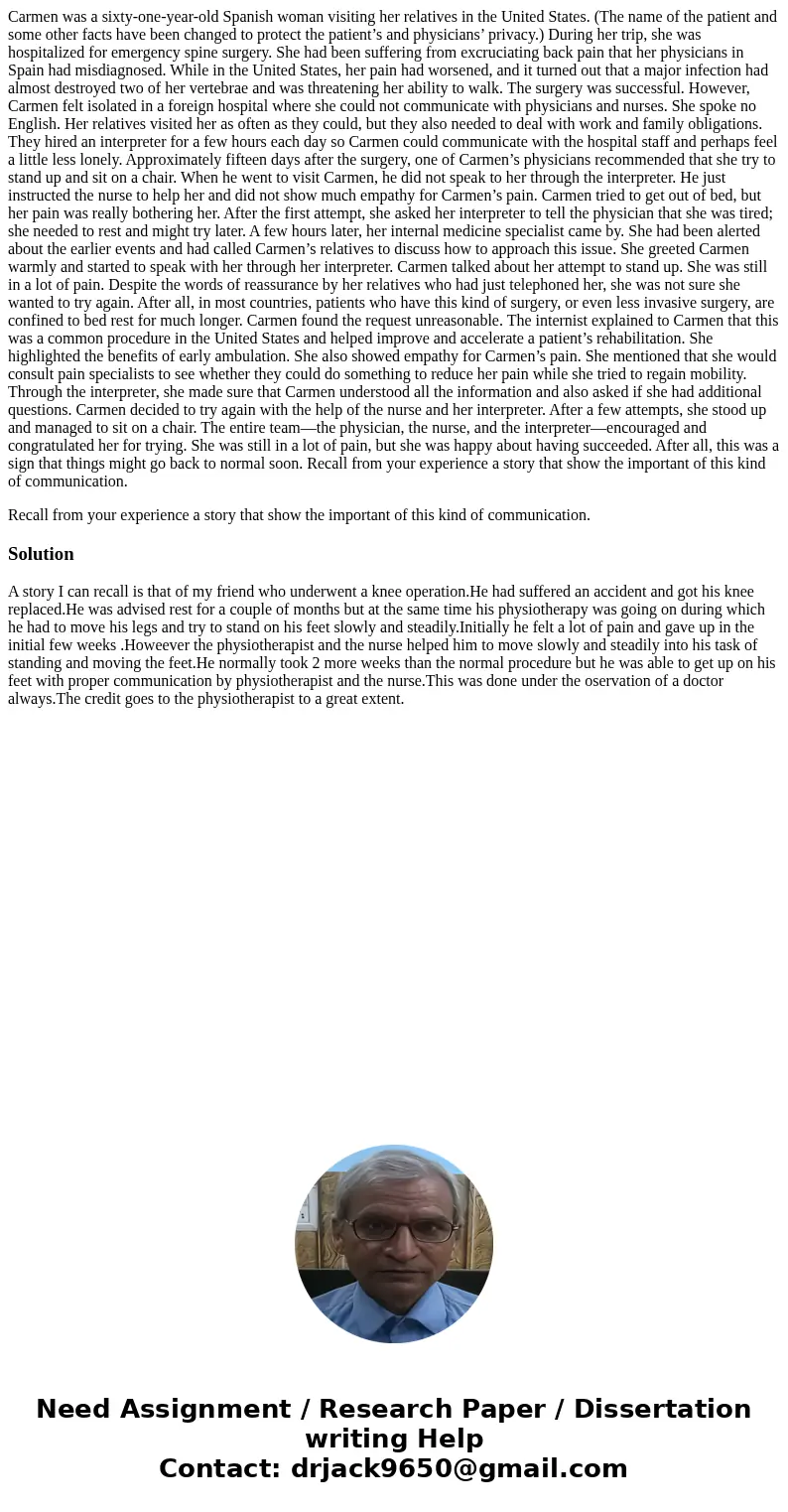Carmen was a sixtyoneyearold Spanish woman visiting her rela
Carmen was a sixty-one-year-old Spanish woman visiting her relatives in the United States. (The name of the patient and some other facts have been changed to protect the patient’s and physicians’ privacy.) During her trip, she was hospitalized for emergency spine surgery. She had been suffering from excruciating back pain that her physicians in Spain had misdiagnosed. While in the United States, her pain had worsened, and it turned out that a major infection had almost destroyed two of her vertebrae and was threatening her ability to walk. The surgery was successful. However, Carmen felt isolated in a foreign hospital where she could not communicate with physicians and nurses. She spoke no English. Her relatives visited her as often as they could, but they also needed to deal with work and family obligations. They hired an interpreter for a few hours each day so Carmen could communicate with the hospital staff and perhaps feel a little less lonely. Approximately fifteen days after the surgery, one of Carmen’s physicians recommended that she try to stand up and sit on a chair. When he went to visit Carmen, he did not speak to her through the interpreter. He just instructed the nurse to help her and did not show much empathy for Carmen’s pain. Carmen tried to get out of bed, but her pain was really bothering her. After the first attempt, she asked her interpreter to tell the physician that she was tired; she needed to rest and might try later. A few hours later, her internal medicine specialist came by. She had been alerted about the earlier events and had called Carmen’s relatives to discuss how to approach this issue. She greeted Carmen warmly and started to speak with her through her interpreter. Carmen talked about her attempt to stand up. She was still in a lot of pain. Despite the words of reassurance by her relatives who had just telephoned her, she was not sure she wanted to try again. After all, in most countries, patients who have this kind of surgery, or even less invasive surgery, are confined to bed rest for much longer. Carmen found the request unreasonable. The internist explained to Carmen that this was a common procedure in the United States and helped improve and accelerate a patient’s rehabilitation. She highlighted the benefits of early ambulation. She also showed empathy for Carmen’s pain. She mentioned that she would consult pain specialists to see whether they could do something to reduce her pain while she tried to regain mobility. Through the interpreter, she made sure that Carmen understood all the information and also asked if she had additional questions. Carmen decided to try again with the help of the nurse and her interpreter. After a few attempts, she stood up and managed to sit on a chair. The entire team—the physician, the nurse, and the interpreter—encouraged and congratulated her for trying. She was still in a lot of pain, but she was happy about having succeeded. After all, this was a sign that things might go back to normal soon. Recall from your experience a story that show the important of this kind of communication.
Recall from your experience a story that show the important of this kind of communication.
Solution
A story I can recall is that of my friend who underwent a knee operation.He had suffered an accident and got his knee replaced.He was advised rest for a couple of months but at the same time his physiotherapy was going on during which he had to move his legs and try to stand on his feet slowly and steadily.Initially he felt a lot of pain and gave up in the initial few weeks .Howeever the physiotherapist and the nurse helped him to move slowly and steadily into his task of standing and moving the feet.He normally took 2 more weeks than the normal procedure but he was able to get up on his feet with proper communication by physiotherapist and the nurse.This was done under the oservation of a doctor always.The credit goes to the physiotherapist to a great extent.

 Homework Sourse
Homework Sourse